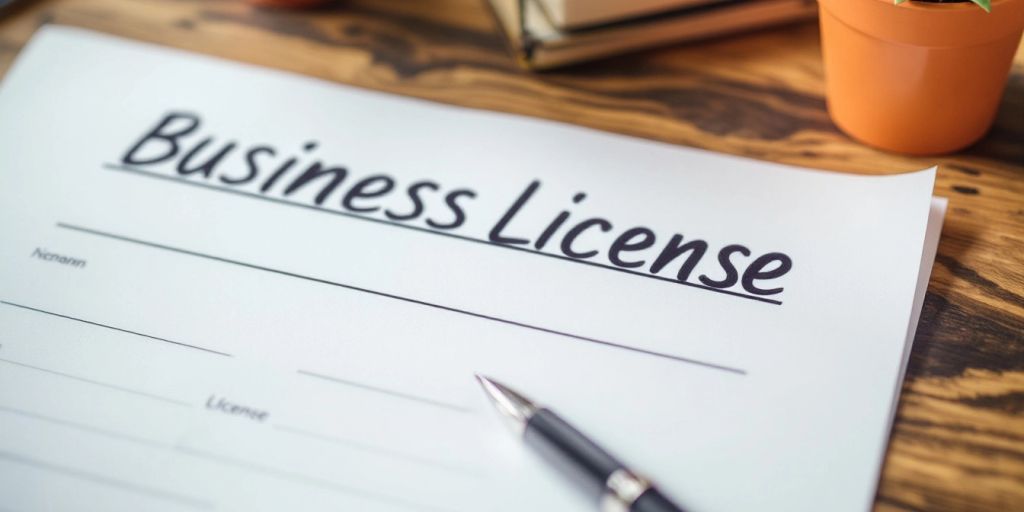Getting a business license is an important step for anyone looking to start or run a business. It allows you to operate legally and helps you comply with local laws. This guide will walk you through the key steps to obtain your business license, ensuring you understand what is needed and how to navigate the process smoothly.
Key Takeaways
- A business license is necessary for legal operation.
- Different types of licenses exist based on your business type and location.
- Research local laws to understand specific requirements.
- Gather all needed documents before applying.
- Stay updated on renewal and compliance requirements.
Understanding the Basics of Business Licenses
What is a Business License?
A business license is a legal document that allows you to operate your business in a specific area. It is required by local, state, or federal governments. Without it, you may face fines or even have to shut down your business. Essentially, it ensures that your business complies with local laws and regulations.
Types of Business Licenses
There are several types of business licenses, including:
- General Business License: Required for most businesses to operate legally.
- Special Permits: Needed for specific activities, like selling alcohol or running a daycare.
- Professional Licenses: Required for certain professions, such as doctors or lawyers.
| License Type | Description |
|---|---|
| General Business License | Basic license to operate a business. |
| Special Permits | For specific activities (e.g., food service). |
| Professional Licenses | For regulated professions (e.g., healthcare). |
Why You Need a Business License
Having a business license is important because:
- Legal Compliance: It ensures you follow local laws.
- Credibility: It builds trust with customers and partners.
- Access to Funding: Many lenders require a license before providing loans.
A business license is any license or permit that a state or government entity requires for companies to operate, including those related to specific business activities.
In summary, understanding the basics of business licenses is crucial for anyone looking to start or run a business. It helps you stay compliant and can enhance your business’s reputation.
Researching Local Requirements

Identifying Your Business Location
When starting a business, the first step is to identify your business location. This is crucial because different areas have different rules. You need to know what your city or county requires. For example, in Texas, to find out more about local business licensing, visit your city or county clerk’s website or office.
Understanding State and Local Regulations
Next, you should understand the state and local regulations that apply to your business. Each state has its own rules, and local governments may have additional requirements. Here are some key points to consider:
- Check if your business type requires a specific license.
- Look into zoning laws that may affect your business location.
- Research health and safety regulations that apply to your industry.
Consulting with Local Authorities
Finally, it’s wise to consult with local authorities. They can provide valuable information about the licensing process. Here are some steps to take:
- Visit your local government office.
- Ask about the necessary permits and licenses.
- Get information on any fees associated with the application process.
Understanding local requirements is essential for a smooth licensing process. It helps you avoid delays and ensures compliance with the law.
Preparing Your Business for Licensing
Gathering Necessary Documentation
To get your business license, you need to collect important documents. This includes:
- Proof of identity: Such as a driver’s license or passport.
- Business structure details: Information about whether your business is a sole proprietorship, partnership, or corporation.
- Tax identification number: This is essential for tax purposes.
Ensuring Compliance with Zoning Laws
Before applying for a business license, check if your business location complies with local zoning laws. Here are some steps to follow:
- Research local zoning regulations: Understand what types of businesses are allowed in your area.
- Contact local zoning office: They can provide specific information about your location.
- Make necessary adjustments: If your business doesn’t comply, you may need to change locations or modify your business plan.
Preparing Financial Statements
Having clear financial statements is crucial for your business license application. You should prepare:
- Balance sheet: This shows your business’s assets and liabilities.
- Income statement: This details your revenue and expenses.
- Cash flow statement: This tracks the money coming in and going out of your business.
Remember: Having all your documents ready can speed up the licensing process and help you avoid delays.
In summary, preparing your business for licensing involves gathering necessary documents, ensuring compliance with zoning laws, and preparing financial statements. This preparation is essential for a smooth application process and to meet the California business license requirements effectively.
The Application Process for a Business License
Filling Out the Application Form
To start the process of obtaining a business license, you need to fill out the application form accurately. This form typically requires basic information about your business, such as:
- Business name and address
- Owner’s name and contact information
- Type of business structure (e.g., sole proprietorship, LLC)
- Description of business activities
Submitting Required Documents
After completing the application form, you must gather and submit several required documents. These may include:
- Proof of identity (e.g., driver’s license)
- Business plan or description
- Zoning clearance (to ensure your business location is compliant)
- Any additional permits specific to your industry
Paying the Application Fee
Finally, you will need to pay an application fee. The fee amount can vary based on your location and the type of business you are starting. Make sure to check the local regulations for the exact fee structure.
Remember, obtaining a business license is a crucial step in ensuring your business operates legally and successfully. Following these steps will help you navigate the process smoothly and avoid potential issues down the line.
By understanding these steps, you can effectively manage the application process and ensure compliance with local laws. This is especially important if you are looking to learn how to get a business license in California (2024 guide).
Maintaining and Renewing Your Business License
Understanding Renewal Requirements
To keep your business license active, you must understand the renewal requirements set by your local government. This often includes:
- Filing renewal applications on time.
- Paying the renewal fee, which can vary based on your license type.
- Providing updated information about your business operations.
Keeping Up with Regulatory Changes
Regulations can change, so it’s important to stay informed. Here are some ways to keep up:
- Subscribe to local business newsletters.
- Attend workshops or seminars related to your industry.
- Regularly check your local government’s website for updates.
Handling License Modifications
If your business changes, you may need to modify your license. This could involve:
- Updating your business name or address.
- Changing your business structure (e.g., from sole proprietorship to LLC).
- Adding new services or products that require additional permits.
Remember, keeping your business license current is crucial for legal compliance and maintaining your business reputation.
| Renewal Type | Fee (Example) | Notes |
|---|---|---|
| Timely Renewal | $450 | For sole owners in California |
| Late Renewal | Varies | Additional fees may apply |
Common Challenges in Obtaining a Business License

Dealing with Bureaucratic Delays
Obtaining a business license can often feel like a long and frustrating process. Many applicants face significant delays due to bureaucratic red tape. This can include:
- Slow processing times by local authorities.
- Incomplete applications leading to back-and-forth communication.
- Changes in regulations that require additional documentation.
Addressing Compliance Issues
Another common challenge is ensuring compliance with all local laws and regulations. Many businesses struggle with:
- Understanding the specific requirements for their industry.
- Keeping up with changes in local laws.
- Meeting zoning requirements that may affect their business operations.
Overcoming Financial Hurdles
Financial challenges can also pose a significant barrier to obtaining a business license. These hurdles may include:
- High application fees that can strain a new business’s budget.
- Costs associated with necessary permits or inspections.
- Potential fines for non-compliance with local regulations.
Navigating the licensing process can be overwhelming, but understanding these challenges can help you prepare better and avoid common pitfalls.
In summary, while obtaining a business license is essential for operating legally, it comes with its own set of challenges. Being aware of these can help you tackle them more effectively and ensure a smoother application process.
Leveraging Professional Help
When it comes to obtaining a business license, getting professional help can make a big difference. Here are some ways you can leverage expertise:
Hiring a Business Consultant
- A business consultant can guide you through the licensing process.
- They can help identify the specific licenses you need based on your business type.
- Consultants often have experience with local regulations and can save you time.
Utilizing Legal Services
- Hiring a lawyer can ensure that all your documents are in order.
- They can help you understand the legal implications of your business license.
- Legal experts can assist in resolving any disputes that may arise during the application process.
Seeking Assistance from Business Associations
- Local business associations often provide resources and support for new businesses.
- They can offer workshops or webinars on managing business licensing compliance.
- Networking with other business owners can provide valuable insights and tips.
Engaging professionals can simplify the licensing process and help you avoid common pitfalls.
By leveraging these resources, you can navigate the complexities of obtaining a business license more effectively.
Final Thoughts on Obtaining a Business License
Getting a business license is an important step for anyone looking to start a business. It helps you follow the law and shows that you are serious about your venture. Remember to check the specific rules in your area, as they can differ from one place to another. Take your time to gather all the necessary documents and fill out the applications carefully. Once you have your license, you can focus on growing your business and serving your customers. Don’t forget to keep your license up to date and renew it when needed. This will help you avoid any legal issues and keep your business running smoothly.
Frequently Asked Questions
What is a business license?
A business license is a legal document that allows you to operate your business in your area. It shows that you are following local laws and regulations.
Do I need a business license for my small business?
Yes, most small businesses need a license to operate legally. The type of license depends on your business activities and location.
How do I apply for a business license?
You can apply for a business license by filling out an application form, which you can usually find on your city or county’s website. You might also need to provide some documents.
How much does a business license cost?
The cost of a business license varies by location and type of business. It can range from a small fee to several hundred dollars.
How long does it take to get a business license?
The time it takes to get a business license can vary. It might take a few days to a few weeks, depending on your local government’s processing time.
What happens if I don’t get a business license?
If you don’t get a business license, you could face fines or even have to shut down your business. It’s important to follow the rules to avoid problems.







